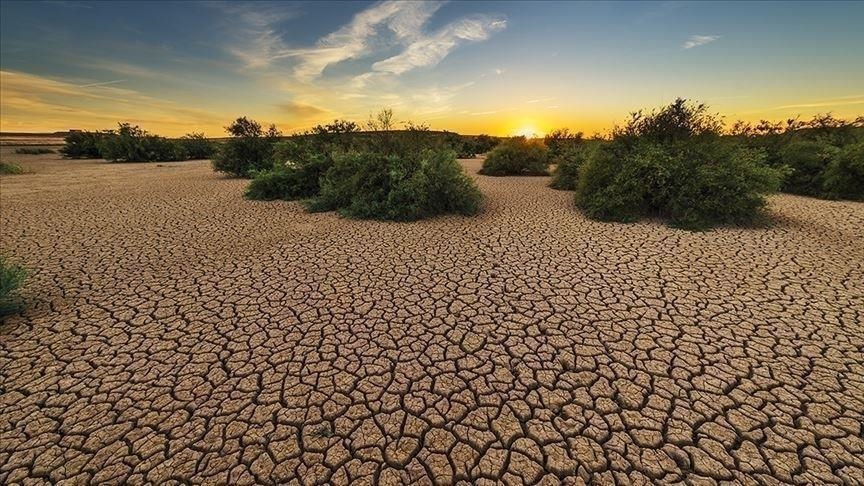The annual report on the state of the climate in Africa was presented on Tuesday and Wednesday by the United Nations and the World Meteorological Organization (WMO). Over 100 million Africans are directly threatened by global warming.
"1,3 billion people remain extremely vulnerable, as Africa warms more and at a rate faster than the world average", says the secretary general of the World Meteorological Organization (WMO). An alarming finding.
On the occasion of the press briefing, held in Geneva, on the presentation of the new UN report on the state of the climate in Africa, several speakers explained why the climate catastrophe will affect Africa much more than the rest of the world. “Climate change is leading to an increase in food insecurity, poverty and displaced populations in Africa”, assures the representative of the African Union (AU) Commission, Josefa Leonel Correia Sacko.
The document, published Tuesday by the UN and presented Wednesday by the WMO and several African officials, recalled that the African populations remained threatened by the global socio-economic crisis. It also highlights the responsibility of the 54 countries of the continent, which emit less than 4% of greenhouse gases in the world.
Recall that the President of the African Group of Negotiators on Climate Change, Tanguy Gahouma, denounced the failure of the G20 countries, responsible for 80% of emissions, to comply with their commitment.t finance the fight against global warming in Africa.
#StateofClimate in #Africa:
In 2020, approximately 12% of all new displacements worldwide were in the East and Horn of Africa region, with over 1.2 million new disaster-related displacements. #Floods and #storms were the main causes, followed by drought.
Details https://t.co/Z4xkhLlfaT pic.twitter.com/wN9IinUPOv- World Meteorological Organization (@WMO) October 19, 2021
Africa vulnerable to global warming
"By 2030, it is estimated that up to 118 million extremely poor people will be exposed to drought, flooding and extreme heat in Africa, if adequate response measures are not put in place," laments Josefa. Sacko. “Extremely poor” people, according to the UN definition, are those who live on less than $ 1,9 a day.
Sacko also explains that "by 2050, in sub-Saharan Africa, climate change will decrease GDP by an average of 3%". The panel of specialists who presented the UN report also insisted on the unpredictability of the degree to which this context will evolve. WMO Secretary General Petteri Taalas said that "several indicators point to the increase in temperatures in Africa gaining momentum".
In particular, floods, landslides, drought, and warming waters. According to the report, the 30-year warming trend from 1991 to 2020 was greater than that of 1961-1990 in all regions of Africa. Also, the rate of sea level rise along the tropical and South Atlantic coasts, as well as along the Indian Ocean, was above the global average.
The report also highlights the shrinking glaciers of Mount Kilimanjaro, Mount Kenya and the Rwenzori Mountains in Uganda as symbols of the rapid and widespread changes to come. “Their current withdrawal rates are above the world average. If this continues, it will lead to total deglaciation by the 2040s, ”warns Taalas.
And the Secretary General of the WMO continued: "Mount Kenya should be de-iced a decade earlier (in 2030, editor's note), which will make it one of the first entire mountain ranges to lose glaciers due to the change. climate induced by humans ”.
Our new #StateofClimate in #Africa report shows that #climatechange is hitting Africa hard.
The African continent has warmed faster than the global average temperature.
But temperatures are only part of the story….
Details https://t.co/EJqsTDIMTD#ClimateAction #COP26 pic.twitter.com/AByYc0UfN4- World Meteorological Organization (@WMO) October 19, 2021
A flagrant injustice in the treatment of the problem
What solutions to these problems? WMO, for its part, calls on Africa to "invest in hydrometeorological infrastructure and early warning systems". Feigned ignorance? Because as COP26 approaches, the immediate challenge is to push the polluting countries, which are also the largest economies in the world, to respect their commitments in Africa.
We will have to start by respecting the financial commitment which, since 2009, has still not reached the annual threshold of 100 billion dollars promised by the G20. Again, this sum is insufficient to stop global warming in Africa. Of course, it would help start certain projects like the Great Green Wall, invest in clean energy, etc. But the commitments made individually by African countries, vis-à-vis their creditors, will remain unachievable, and will undoubtedly lead to “climate nationalism”.
Some industrialized African countries, such as South Africa, are closer to realizing renewable energy projects, and rely less and less on fossil fuels for power plants. Other countries, on the other hand, have made such commitments this year when their carbon impact is minimal, such as Côte d'Ivoire, Tunisia, Mozambique and Botswana.
Political deals, no doubt, but which exacerbate the impunity of the G20 countries, which find in the docility of African countries a boon for savage industrialization. And while COP26 will take place with a reduced African presence, Africa remains the most threatened continent.
